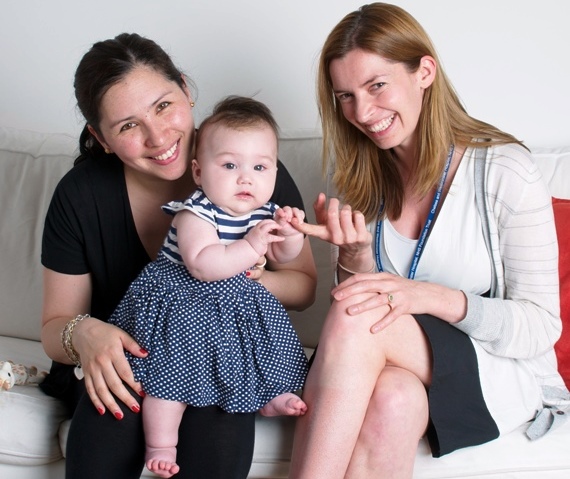Archived
Please note, this page may contain outdated information or subject matter.
Dr Karen Logan helps us mark Diabetes Week (12-18 June) by sharing her work, funded by an Action Research Training Fellowship, into diabetes in pregnancy and how it may affect the health and weight of babies and children.

Dr Logan (right) with study participant baby Ava and her mum Liana
What inspired you to investigate this particular area?
I started work in paediatrics over 10 years ago and always had an interest in growth and diabetes in children. Diabetes is one of the biggest health challenges in the UK and in recent decades is has become clear that influences during pregnancy and early life can impact longer term health in children. I think that prevention is crucial, by tackling high-risk groups early in life, and this led me to study infants whose mothers have diabetes during pregnancy.
What does Action funding for this study mean to you?
I was extremely grateful to Action Medical Research for awarding me a two year fellowship to carry out this research. The support of Action Medical Research has been invaluable and enabled me to dedicate my time to studying how diabetes in pregnancy may influence how babies lay down fat in early life. I hope the results of this work provide a first step towards reducing the epidemic of obesity and diabetes in children and young people.
What does a typical day look like for you … or is every day different?
A typical day involves meeting families with newborn babies on the postnatal ward, to explain the study and what would be involved for their baby. I scan babies using magnetic resonance (a technique that does not involve X-ray). We weigh and measure the length of the baby and the families then settle their baby to sleep. This part can vary in duration, particularly in older babies who just aren’t ready to sleep! Once asleep, the baby is placed inside the scanner and we obtain images of fat throughout their body and liver. Working with the families and babies taking part in this study was one of the most rewarding aspects of the research.
Can you tell us a bit about your team?
Our research team has a number of interests including the effects of early life factors (such as preterm birth, caesarean deliveries and type of milk feed) on health in infancy and later life. Our group includes scientists, a research midwife, statisticians, data analysts and doctors. I worked closely with colleagues to recruit and scan babies, and to analyse the results of the study.
Who’s your research hero, and why?
I have a few! I have to mention Elsie Widdowson, a British dietician, whose work together with Dr Robert McCance led to the discovery of ‘critical periods’ of growth of babies in the womb. In the early 1990s David Barker proposed that ‘the womb may be more important than the home’. He pioneered the concept that the nourishment a baby receives from its mother influences disease in later life, and stimulated an area of research our group is involved in today. And of course my boss! Professor Neena Modi is completely dedicated to clinical research in infants and children and describes herself as ‘dogged, determined, driven’, which is evident from all that she has achieved!
As a charity, Action began in 1952 with our founder’s quest to find a cure for polio. What led you to a career in medical research?
I was brought up in a medical family (my mother worked in medical genetics and my father was a consultant working in research with interests including diabetes and metabolic medicine.) I was always interested in research and after completing my medical degree in Newcastle and early paediatrics training in London, I was offered a Walport Fellowship. This provided an introduction to medical research at Imperial College in a well-established group led by Professor Neena Modi. The project involved the study of infants of mothers with and without diabetes, and has proven to be very interesting!
Action’s loyal and lovable mascot Paddington Bear™ is very fond of marmalade sandwiches. What’s your favourite snack?
I am a bit of a chilli fiend! Anything with chilli is great (even chillies on their own).
Tell us something that will surprise us…
I love cold water swimming and surfing, although I wouldn’t claim to excel at either!
You can find out more about Dr Logan’s research at Imperial College London here.
